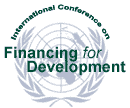
Department of Public Information - News and Media Services Division - New York
18-22 March 2002
19 March 2002
 |
International
Conference on Financing for Development Department of Public Information - News and Media Services Division - New York |
|
| Monterrey, NL, Mexico 18-22 March 2002 |
19 March 2002 |
|
PRESS CONFERENCE BY CHAIRMAN OF OECD DEVELOPMENT ASSISTANCE COMMITTEE
After falling from 1992 to 1997, rates of official development assistance (ODA) had risen in 1998 and 1999, then stabilized in 2000, Jean-Claude Faure, Chairman of the Development Assistance Committee of the Organization for Economic Cooperation and Development (OECD), told correspondents this morning.
Briefing correspondents on the 2001 Report of the Committee on Development Assistance, which provides figures about ODA volume and allocation and information on OECD member policies, Mr. Faure said that, although it was too early to tell, he thought that ODA had perhaps again increased in 2001 -- which augured well for the future. New approaches had been undertaken in development cooperation and fighting poverty. Globalization was starting to be seen in a new light -- one that put it in the service of development for all. Old views were being left behind and globalization was being made more inclusive.
"We have to jump into the process -- we have to do things", he said. Shared rules of the game were needed. Coherence in all policies -- multilateral and bilateral, local and international -- was also key, as Seiichi Kondo, Deputy Secretary-General of the OECD, and Rubens Ricupero, Secretary-General of the United Nations Conference on Trade and Development (UNCTAD), had said yesterday. The search for performance was also extremely important. "We have to be performing", he said.
The process would rely on mutual accountability and shared responsibility, he said. The conferences in Doha, Monterrey, and Johannesburg were providing a "road map". The situation should not be seen as business as usual -- a dynamic process had been undertaken. The donor community had an important role to play. This involved both the quality and the role of aid, which was being differentiated these days. The quality of aid would depend on what partner countries were doing. It would also depend on how the donor countries provided that aid.
Aid volumes should increase if poverty was to be fought and socio-economic capacities were to be built, he said. With mutual accountability and effectiveness, donors were beginning to increase their aid. The recent decisions on increasing ODA by the United States -- by $5 billion -- and the European Union -- by $9 billion -- were important steps.
In response to a question on increase in ODA and its allocation, he said there would have been some $100 billion more of ODA if the levels had not slumped from 1992 to 1997. There had been an increase of about 7 per cent in 1998, and 6 per cent in 1999, with stabilization in 2000.
The ODA must be increased if the fight against poverty and for sustainable development was to be carried out, he continued. The donor community stood much more ready than before to address the situation. He noted that poverty reduction strategies were linked to health and other social issues.
Responding to a question on corruption and bad use of aid in the past, he said all knew that there was corruption in the world. After the cold war, the financing of conflicts had been privatized in many cases, through the private use of public funds. However, many countries had embarked on policies of good governance. With partnership and mutual accountability, aid could be used in a better way. Developed countries, as partners, should support the efforts of all developing countries. Inequalities must not be exacerbated. He noted that many different countries were recipients of ODA -- not just the poorest. He cited China as an example.
He affirmed a correspondent's assertion that $54 billion was the current amount of ODA. Hopefully, it would continue to increase. The process must be long and ongoing.
Press Conferences
Conference News